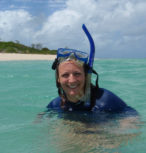DNA reveals the past and future of coral reefs
New DNA techniques are being used to understand how coral reacted to the end of the last ice age in order to better predict how they will cope with current changes to the climate. James Cook Univer

From 2005 to 2022, the main node of the ARC Centre of Excellence for Coral Reef Studies was headquartered at James Cook University in Townsville, Queensland (Australia)








Abstract: In the Pacific Island region, marine resources make vital contributions to food security, livelihoods and economic development. Climate change is expected to have profound effects on the status and distribution of coastal and oceanic habitats, the fish and invertebrates they support and, as a result, the communities that depend on these resources. To prepare for and respond to these impacts – and ensure the ongoing sustainability of marine ecosystems and fisheries, and the communities that rely on them economically and culturally – it is necessary to understand what the impacts are and identify effective adaptation actions. In particular, declines in reef habitats and associated demersal and invertebrate coastal fisheries productivity, and more eastward distribution of tuna, are expected to present the greatest challenges for reef-dependent communities. Some aquaculture commodities, such as species with calcareous shells, will also be impacted by climate change and ocean acidification. The presentation will overview projects working in the Pacific and how they are using science to drive vulnerability assessments to inform adaptation planning and decision-making. The adaptations, policies and investments recommended to reduce the threats of climate change to marine resources, are of interest to a broad range of stakeholders in the region.
Biography: Johanna Johnson has 25 years’ experience working in applied ecosystem science, particularly on climate change implications for tropical marine ecosystems and communities. Johanna has worked as a researcher and natural resource manager, having lead studies on marine protected area management, climate change vulnerability assessments, and community-based adaptation to climate change. She has worked in the Great Barrier Reef, Torres Strait Islands, Pacific Island region, Caribbean and southeast Asia. She has spent over a decade assessing climate vulnerabilities and developing tools to operationalize the concept into practical adaptation actions. Johanna has worked in the Pacific region since 2008, and has current projects supporting climate change adaptation in Vanuatu, PNG, Solomon Islands, and Fiji. She has expertise in using diverse sources of information to inform practical climate change adaptation, and working with local communities to develop and implement on-ground local actions.
New DNA techniques are being used to understand how coral reacted to the end of the last ice age in order to better predict how they will cope with current changes to the climate. James Cook Univer
A new study on the effects of climate change in five tropical countries has found fisheries are in more trouble than agriculture, and poor people are in the most danger. Distinguished Profess
James Cook University researchers have found brightly coloured fish are becoming increasingly rare as coral declines, with the phenomenon likely to get worse in the future. Christopher Hemingson, a
Researchers working with stakeholders in the Great Barrier Reef region have come up with ideas on how groups responsible for looking after the reef can operate more effectively when the next bleaching
Abstract: As marine species adapt to climate change, their heat tolerance will likely be under strong selection. Individual variation in heat tolerance and its heritability underpin the potential fo
Abstract: The Reef Ecology Lab in KAUST’s Red Sea Research Center explores many aspects of movement ecology of marine organisms, ranging from adult migrations to intergenerational larval dispersal
Abstract: Macroalgal meadows are a prominent, yet often maligned component of the tropical seascape. Our work at Ningaloo reef in WA demonstrate that canopy forming macroalgae provide habitat for ad
Abstract: Sharks are generally perceived as strong and fearsome animals. With fossils dating back at least 420 million years, sharks are not only majestic top predators but they also outlived dinosa
Abstract: Connectivity plays a vital role in many ecosystems through its effects on fundamental ecological and evolutionary processes. Its consequences for populations and metapopulations have been
Abstract: Evolution of many eukaryotic organisms is affected by interactions with microbes. Microbial symbioses can ultimately reflect host’s diet, habitat range, and even body shape. However, how
Abstract: The past few years have seen unprecedented coral bleaching and mortality on the Great Barrier Reef (GBR) but the consequences of this on biodiversity are not yet known. This talk will expl